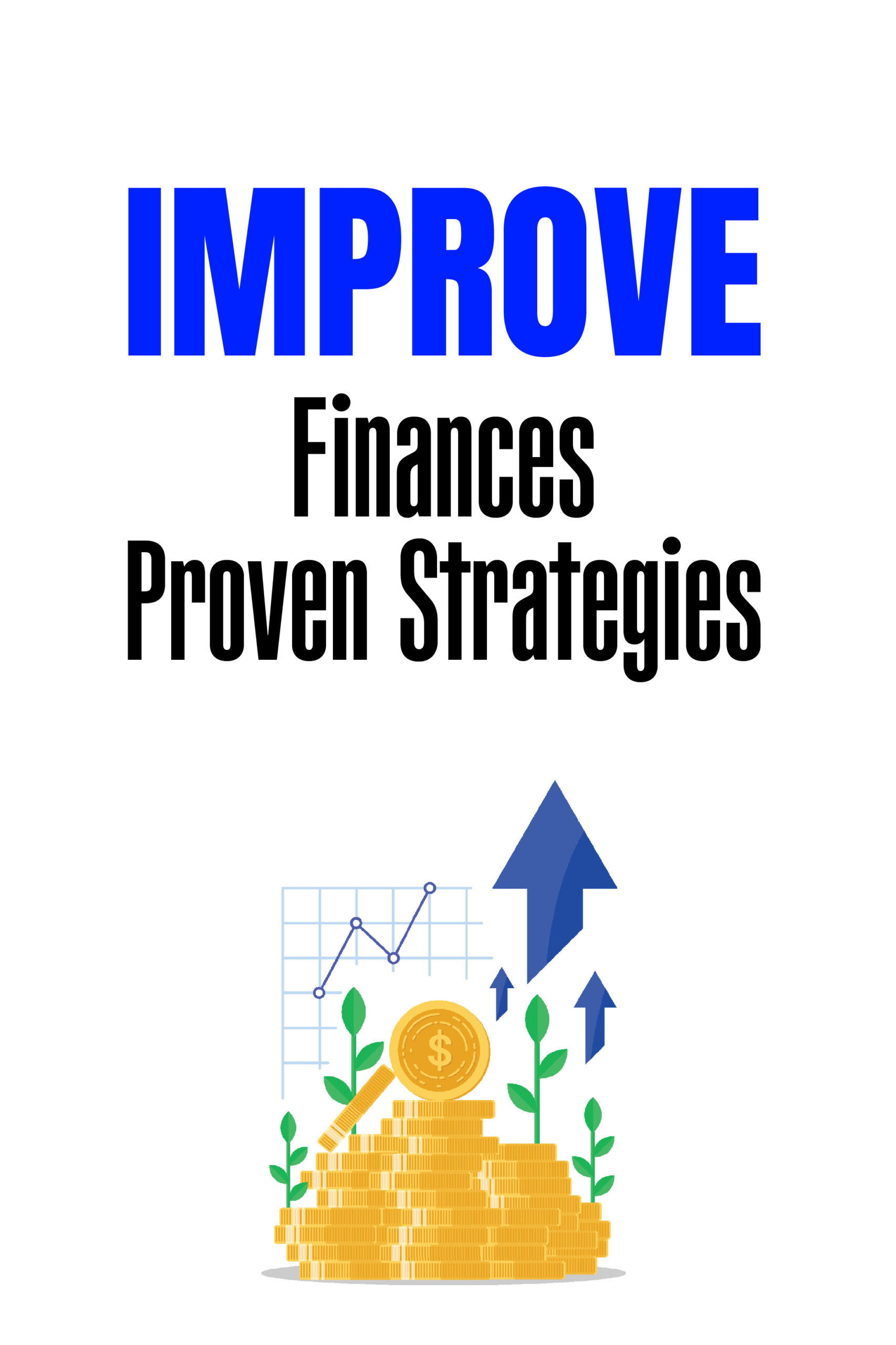To improve your finances, create a budget and track your spending. Save regularly and invest wisely for future growth.
Improving your finances requires diligent planning and smart decisions. Start by assessing your current financial situation. List your income sources and track all expenses. This helps identify areas where you can cut costs. Setting a budget will guide your spending habits and ensure you live within your means.
Regularly saving a portion of your income builds an emergency fund for unexpected expenses. Investing in stocks, bonds, or real estate can grow your wealth over time. Avoid high-interest debts and focus on paying off existing loans. These steps create a solid foundation for financial stability and growth.

Credit: www.wiseradvisor.com
Setting Financial Goals
Achieving financial stability starts with setting financial goals. Goals give direction and purpose to your money management. By breaking them into short-term and long-term, you can create a clear roadmap.
Short-term Goals
Short-term goals are goals that you can achieve within a year. These goals help you manage immediate financial needs and build a strong foundation. Here’s a list of common short-term goals:
- Create an emergency fund – Save at least $500 for unexpected expenses.
- Pay off small debts – Focus on debts like credit card balances.
- Set a budget – Track your income and expenses to save more.
- Save for a specific purchase – Plan for items like a new phone or a vacation.
Long-term Goals
Long-term goals take more than a year to achieve. These goals are crucial for your future financial health. Common long-term goals include:
- Save for retirement – Contribute regularly to a retirement fund.
- Buy a home – Save for a down payment on a house.
- Pay off large debts – Focus on student loans or mortgage.
- Build a college fund – Save for your children’s education.
To stay on track, review your goals regularly. Adjust as needed. Celebrate small wins. Keep your financial future bright.
Creating A Budget
Creating a budget is key to improving your finances. It helps you track your spending and save money. A budget gives you control over your financial future.
Tracking Expenses
To start, list all your expenses. Write down every penny you spend.
- Groceries
- Rent or Mortgage
- Utilities
- Transportation
- Entertainment
Use a notebook or a budgeting app. Keep track of every purchase. This helps identify where your money goes.
Allocating Funds
Next, allocate your funds wisely. Divide your income into categories.
| Category | Percentage |
|---|---|
| Needs | 50% |
| Wants | 30% |
| Savings | 20% |
Follow these steps to allocate your funds:
- Calculate your total income.
- List your fixed expenses (e.g., rent, utilities).
- Set aside money for variable expenses (e.g., groceries, entertainment).
- Save a portion of your income.
Review your budget regularly. Adjust it as needed.
Building An Emergency Fund
Creating an emergency fund is crucial for financial stability. It provides a safety net for unexpected expenses. This fund can prevent debt and offer peace of mind. Let’s explore how to build an emergency fund effectively.
Determining The Amount
First, decide how much you need in your emergency fund. A good rule of thumb is to save three to six months’ worth of expenses. This amount depends on your monthly spending and lifestyle.
Make a list of essential monthly expenses:
- Rent or mortgage
- Utilities
- Groceries
- Transportation
- Insurance
Calculate the total and multiply by three to six months. This gives you a target for your emergency fund.
Saving Consistently
Start saving regularly to build your fund. Set a monthly savings goal. Even small amounts add up over time.
Consider setting up automatic transfers to your savings account. This ensures you save without thinking about it. Consistency is key.
Here are some tips to save consistently:
- Track your spending to find areas to cut back.
- Create a budget and stick to it.
- Reduce unnecessary expenses.
- Increase your income if possible.
Use a table to track your progress:
| Month | Amount Saved |
|---|---|
| January | $200 |
| February | $200 |
| March | $200 |
Keep your emergency fund in a separate account. This avoids spending it accidentally.

Credit: infamouscpa.wordpress.com
Managing Debt
Debt can be overwhelming. Learning to manage it can improve your finances. This section will cover two main strategies: Debt Repayment Plans and Consolidation Options. By understanding these, you can take control of your financial future.
Debt Repayment Plans
Creating a debt repayment plan is crucial. Start by listing all your debts. This can include credit cards, loans, and mortgages.
| Type of Debt | Amount Owed | Interest Rate |
|---|---|---|
| Credit Card | $5,000 | 15% |
| Student Loan | $20,000 | 5% |
| Mortgage | $150,000 | 4% |
Choose a repayment strategy:
- Snowball Method: Pay off the smallest debt first. Then move to the next smallest.
- Avalanche Method: Pay off the highest interest rate debt first. Then move to the next highest.
Set a budget and stick to it. Allocate extra money towards debt repayment.
Consolidation Options
Debt consolidation can simplify your payments. It merges multiple debts into one.
There are different consolidation options:
- Personal Loans: Use a personal loan to pay off multiple debts. This leaves you with one monthly payment.
- Balance Transfer Credit Cards: Transfer high-interest credit card debt to a lower interest card.
- Home Equity Loans: Use your home’s value to consolidate debt. This often has lower interest rates.
Compare interest rates and terms. Choose the option that saves you the most money.
Investing Wisely
Investing wisely is key to improving your finances. With smart investments, you can grow your wealth steadily. This section will explore diversification and risk management.
Diversification
Diversification is spreading your investments. It reduces risk by not putting all your money in one place. Here’s how you can diversify:
- Stocks: Invest in different companies.
- Bonds: Balance your portfolio with bonds.
- Real Estate: Consider property investments.
- Mutual Funds: Pool your money with others.
Diversifying helps protect your money. If one investment fails, others can support you.
Risk Management
Managing risk is important for investing. You need to understand the risks involved. Here are some tips:
- Research: Know what you are investing in.
- Asset Allocation: Divide investments based on risk tolerance.
- Regular Reviews: Check your investments regularly.
- Emergency Fund: Keep some money liquid for emergencies.
These strategies help you manage risks and safeguard your investments.
| Investment Type | Risk Level | Potential Return |
|---|---|---|
| Stocks | High | High |
| Bonds | Medium | Medium |
| Real Estate | Low | Medium |
| Mutual Funds | Varies | Varies |
Understanding the risk and return of each investment type is crucial. It helps you make informed decisions.

Credit: www.completecontroller.com
Increasing Income
Improving your finances often means finding ways to increase your income. This can be achieved through various means such as taking on side hustles or advancing in your career. Let’s explore these options.
Side Hustles
Side hustles are a great way to earn extra money. They can be done in your free time and can complement your main job. Here are some popular side hustle ideas:
- Freelance writing or graphic design
- Ridesharing services like Uber or Lyft
- Selling handmade crafts on Etsy
- Online tutoring or teaching
Freelance writing can earn you extra money from home. Ridesharing services let you use your car to make money. Selling crafts can turn hobbies into income. Online tutoring helps others while boosting your income.
Career Advancement
Advancing in your career can significantly increase your income. This often involves gaining new skills or taking on more responsibilities. Consider these tips:
- Take additional courses or certifications
- Seek mentorship from experienced colleagues
- Request feedback to improve your performance
- Apply for promotions or higher-paying roles
Courses and certifications can make you more valuable. Mentorship provides guidance and insight. Regular feedback helps you improve your skills. Applying for promotions can lead to higher salaries.
By exploring side hustles and focusing on career advancement, you can effectively increase your income and improve your finances.

Saving For Retirement
Saving for retirement is crucial for financial stability in later years. By planning early, you can ensure a comfortable and stress-free retirement. This section explores various strategies to boost your retirement savings.
Retirement Accounts
Retirement accounts are essential for long-term financial health. They offer tax benefits and growth opportunities.
- 401(k): Many employers offer this plan. Contributions are often matched by employers.
- IRA: An Individual Retirement Account offers tax advantages. You can choose between Traditional and Roth IRAs.
- Pension Plans: Some employers still offer these. They provide a guaranteed income in retirement.
Contribution Strategies
Effective contribution strategies are key to maximizing your retirement savings.
- Start Early: The earlier you start, the more you benefit from compound interest.
- Maximize Employer Match: Always contribute enough to get your employer’s full match.
- Increase Contributions: Gradually increase your contributions as your income grows.
| Account Type | Annual Contribution Limit | Tax Benefits |
|---|---|---|
| 401(k) | $19,500 | Pre-tax contributions |
| IRA | $6,000 | Tax-deferred growth |
| Roth IRA | $6,000 | Tax-free withdrawals |
By understanding these accounts and strategies, you can build a robust retirement plan. Start saving today for a secure tomorrow.
Seeking Professional Advice
Improving your finances is a key goal for many people. Seeking professional advice can help you achieve this goal faster. Professionals have the knowledge and experience to guide you. They can help you make informed decisions and avoid costly mistakes.
Financial Advisors
Financial advisors are experts who can help manage your money. They provide personalized advice based on your financial situation. Advisors can help with budgeting, investing, and retirement planning. Choosing the right advisor is important. Look for advisors with good reviews and proper certifications.
Here are some benefits of working with a financial advisor:
- Personalized financial plans
- Expert investment advice
- Help with tax planning
- Guidance on retirement savings
Educational Resources
Learning about finances can help you make better decisions. Educational resources are available in many forms. Books, online courses, and podcasts are popular options. These resources cover topics like budgeting, investing, and debt management. Using them can improve your financial literacy.
Consider these popular educational resources:
| Resource Type | Example | Benefits |
|---|---|---|
| Books | Rich Dad Poor Dad | Provides financial wisdom |
| Online Courses | Coursera Finance Courses | Interactive learning |
| Podcasts | The Dave Ramsey Show | Real-world advice |
Using these resources can help you understand financial concepts. You can then apply this knowledge to your own finances.
Frequently Asked Questions
What Is The 50 30 20 Rule?
The 50 30 20 rule is a budgeting method. Allocate 50% of income to needs, 30% to wants, and 20% to savings or debt repayment. This approach helps manage finances effectively and ensures balanced spending.
How Do I Stop Struggling Financially?
Create a budget, track expenses, and prioritize saving. Reduce debt, increase income, and seek financial advice.
How To Start Improving Your Finances?
Start by creating a budget to track expenses. Reduce unnecessary spending. Build an emergency fund. Pay off high-interest debt. Invest for the future.
How Can I Become Financially Stronger?
Save consistently, reduce debt, invest wisely, create a budget, and seek financial advice. Prioritize financial education.
Conclusion
Improving your finances is achievable with consistent effort and smart strategies. Track expenses, set clear goals, and invest wisely. Small changes can lead to big financial gains. Stay disciplined and informed to secure a brighter financial future. Empower yourself with knowledge and take control of your financial well-being.

